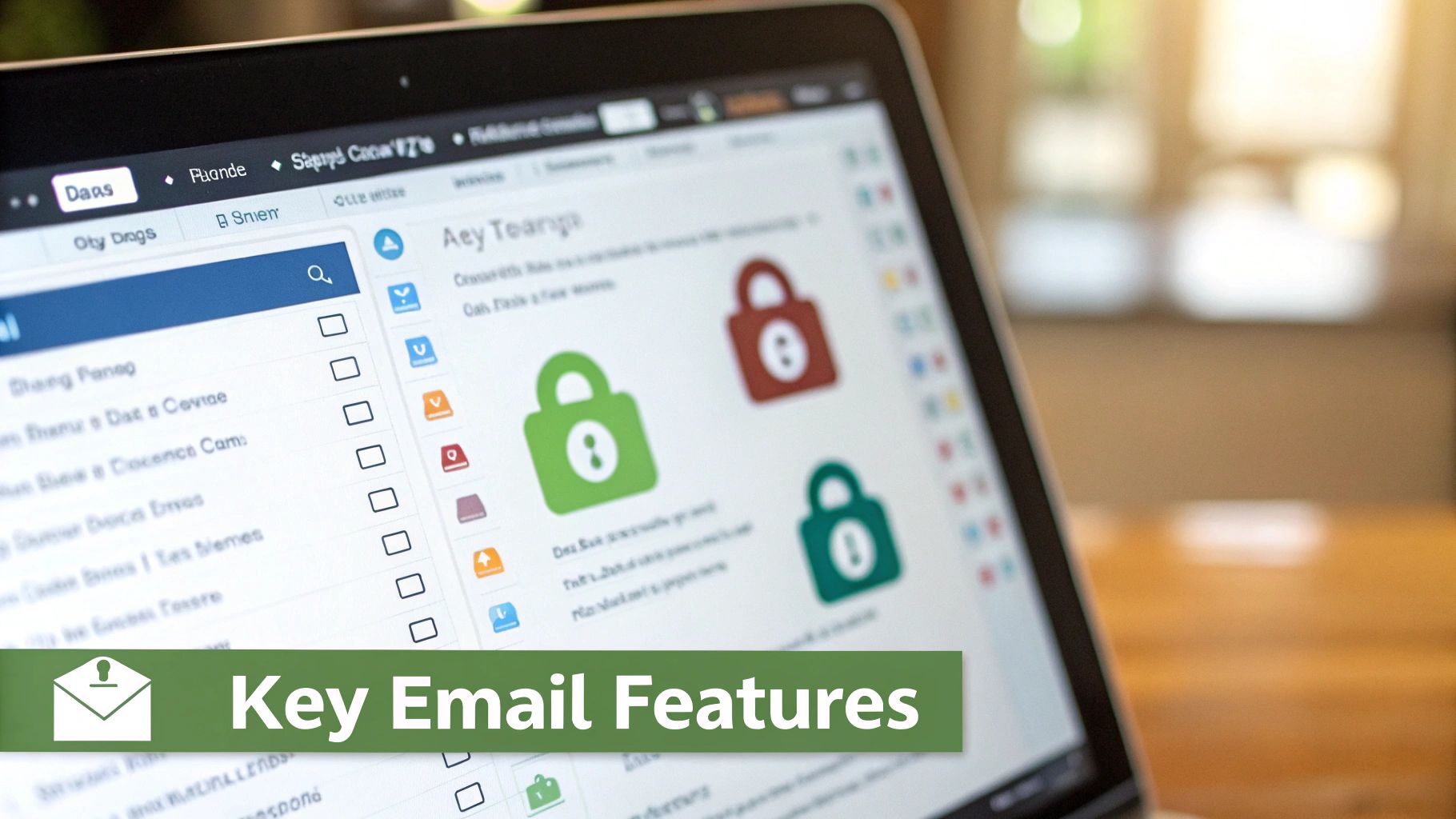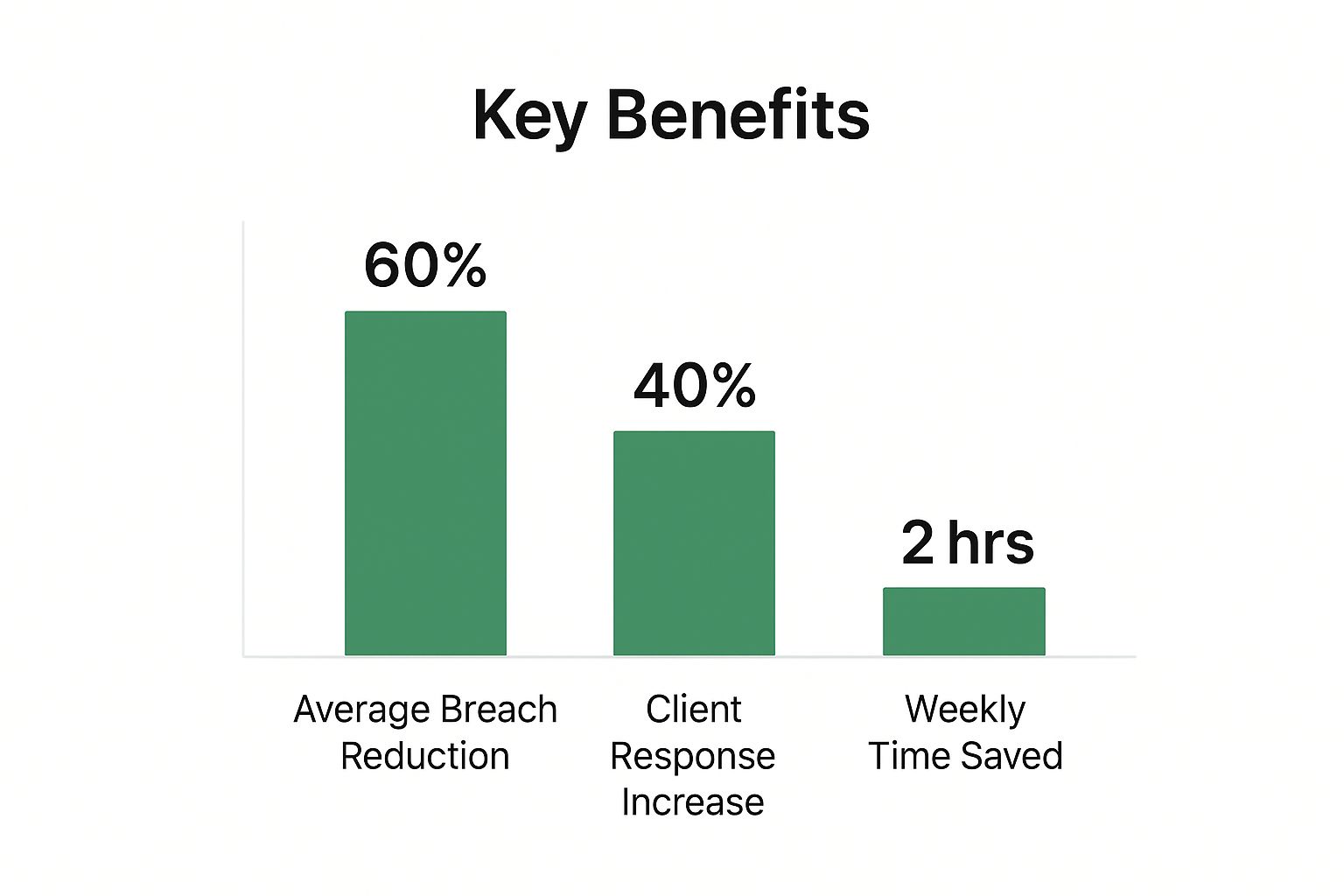HIPAA Compliant Email For Therapists: Secure Practice Guide

Understanding What Makes Email HIPAA Compliant For Therapists

Not all email providers offer the same level of security, especially regarding HIPAA compliance for therapists. While many platforms advertise security features, true HIPAA compliance requires a thorough understanding of the regulations and how they specifically apply to mental health practices. This goes beyond basic security and involves solutions designed for the complexities of handling sensitive patient data.
Key Requirements of HIPAA Compliant Email
HIPAA compliance centers around safeguarding Protected Health Information (PHI). This encompasses any information that could identify a patient, including name, address, medical records, and even appointment times. Therapists must adhere to strict requirements for email communication involving this information.
- End-to-End Encryption: This is essential. Encryption transforms email content into unreadable data, requiring a decryption key for access. This protects PHI even if an email is intercepted.
- Business Associate Agreement (BAA): A BAA is a legally binding contract between the therapist (the covered entity) and the email provider (the business associate). It details each party's responsibilities for protecting PHI and is crucial for compliance.
- Access Controls: Limiting access to PHI is paramount. This involves robust passwords, two-factor authentication, and the ability to manage access to specific patient information within a practice.
- Audit Trails: Comprehensive records of email access and activity are essential for demonstrating compliance during audits. These logs provide proof of your commitment to protecting patient data.
These components create a secure environment for email communication. Without all of them, an email system may be vulnerable. HIPAA compliant email is crucial for therapists to maintain patient confidentiality and security. Because HIPAA rules apply to both covered entities and business associates when PHI is created, received, stored, or transmitted via email, therapists must use email services that meet these standards. Providers like Microsoft and Google are known for offering HIPAA-secure email solutions in 2025, vital for healthcare professionals like therapists protecting sensitive data. Learn more about HIPAA compliance for email.
Why Your Current Email Might Not Be Enough
Standard email providers such as Gmail or Outlook, while offering some security, often don't fully comply with HIPAA. They may lack a BAA or have inadequate access controls, potentially exposing your practice to risk. For more information, see: How to master HIPAA Compliant Email Encryption. Dedicated HIPAA compliant email solutions are crucial for therapists. These solutions are designed to meet the strict legal requirements, ensuring patient data is protected.
Understanding Covered Entities and Business Associates
Under HIPAA, therapists are covered entities directly responsible for protecting PHI. Email providers handling PHI on a therapist's behalf are business associates. This distinction clarifies each party's legal obligations. This shared responsibility underscores the importance of a strong BAA to ensure both parties are committed to maintaining compliance. A well-defined BAA outlines the specific duties of both therapist and email provider, creating a framework for secure and compliant communication. This partnership is vital for minimizing data breach risks and maintaining patient trust.
The Hidden Costs Of Email Security Breaches In Therapy

Email breaches pose a significant and increasing threat to the well-being of therapy practices. These incidents are not merely hypothetical; they are actively occurring, and their repercussions can be devastating. Beyond the immediate financial penalties for HIPAA violations, the less obvious costs can severely impact a practice.
Beyond the Fines: Reputational Damage and Loss of Trust
One of the most substantial hidden costs is the harm done to a therapist's reputation. A breach undermines patient trust, the cornerstone of any successful therapeutic relationship. This loss of trust can result in patients leaving and sharing negative experiences, further jeopardizing the practice's viability. Rebuilding trust can be a long and challenging undertaking, and in some cases, may be impossible.
A breach can also trigger legal action from patients whose confidential information was exposed. This can entail significant legal fees and settlements, placing further strain on the practice's finances. The emotional distress experienced by both patients and therapists can be considerable, compounding the difficulties of an already challenging situation. Imagine, for instance, the emotional burden on a patient whose deeply private information is suddenly made public.
The Financial Fallout: More Than Just HIPAA Fines
The financial ramifications of an email breach reach far beyond HIPAA fines. The expenses related to investigating the breach, notifying affected patients, and implementing corrective actions can be substantial. Moreover, there's the potential loss of revenue due to decreased patient numbers and the necessity of investing in enhanced security measures. This financial strain can be particularly difficult for smaller and solo practices to manage.
Cybercriminals are increasingly targeting mental health professionals because they understand the inherent value of the sensitive data they possess. The need for HIPAA-compliant email solutions is underscored by the alarming frequency of email breaches within the healthcare industry. A report examining 180 healthcare email breaches between January 1, 2024, and January 31, 2025, revealed that email remains the primary attack vector, with 43.3% of breaches involving Microsoft 365. This highlights the importance of therapists utilizing secure email services like Typewire to mitigate data breaches. More detailed statistics are available here.
Common Attack Vectors and Vulnerabilities
Understanding how these breaches happen is critical for effective prevention. Common attack methods include:
- Phishing: Deceptive emails crafted to trick individuals into disclosing sensitive information.
- Ransomware: Malicious software that encrypts data and holds it hostage until a ransom is paid.
- Malware: Harmful software designed to steal data or disrupt system operations.
Smaller and solo therapy practices are often more susceptible due to limited resources and technical expertise. Seemingly small security oversights, such as weak passwords or outdated software, can create entry points for cybercriminals. Therefore, a comprehensive approach to email security, including the use of HIPAA-compliant email for therapists, is vital. A service like Typewire offers robust security features specifically tailored for the needs of therapists. This proactive strategy protects sensitive patient information and shields practices from the devastating effects of a breach.
Choosing The Right HIPAA Email Provider For Your Practice
Selecting a HIPAA compliant email solution for therapists isn't a simple task. The best choice depends on several factors, including the size of your practice, your budget, and the specific features you need. A poor decision can result in unnecessary costs and potential security risks. Careful consideration is essential.
Key Considerations For Therapists
Solo practitioners may find that a simpler, more affordable option with basic encryption and a straightforward Business Associate Agreement (BAA) meets their needs. Larger group practices, however, often require more robust features.
These might include secure file sharing, e-signature integration, and detailed access controls. For further insights, you might find this resource helpful: Top 7 HIPAA Compliant Email Hosting Providers in 2025.
Carefully evaluating the BAA is crucial. This agreement outlines the responsibilities of both the therapist and the email provider regarding the protection of Protected Health Information (PHI). Therapists should thoroughly review the BAA, paying particular attention to data breach protocols and liability clauses.
Pricing and Integration: Finding the Right Balance
Pricing models vary among providers. Some offer fixed monthly fees, while others charge per user. Therapists should consider their current budget and anticipated growth when evaluating pricing structures.
Integration with existing practice management software is another key factor. Seamless integration can streamline workflows and improve efficiency by eliminating manual data entry and reducing the risk of errors.
The infographic below highlights the key benefits of using HIPAA-compliant email:

As the data illustrates, a HIPAA-compliant email solution can significantly bolster security, reducing breaches by 60%. It also enhances client communication, leading to a 40% increase in response rates. Furthermore, it saves valuable time, freeing up an average of 2 hours per week. This allows therapists to focus on other important tasks, improving overall practice efficiency.
To help you compare different providers, we've compiled the following table:
HIPAA Compliant Email Providers Comparison: A detailed comparison of top email providers showing features, pricing, and suitability for different therapy practice sizes.
| Provider | Monthly Cost | Key Features | Best For | BAA Available |
|---|---|---|---|---|
| Hushmail | Varies by plan | Encrypted email, secure forms | Solo practitioners and small practices | Yes |
| Virtru | Varies by plan | End-to-end encryption, data loss prevention | Small to large practices | Yes |
| Paubox | Varies by plan | Seamless integration with existing email platforms | Small to large practices | Yes |
| Google Workspace (with HIPAA compliance add-on) | Varies by plan | Familiar interface, integration with other Google services | Small to large practices | Yes |
| Microsoft 365 (with HIPAA compliance add-on) | Varies by plan | Wide range of features, integration with other Microsoft services | Small to large practices | Yes |
This table provides a quick overview of some popular HIPAA-compliant email providers. Remember to research each provider thoroughly to determine the best fit for your specific needs.
User Experience and Support: Essential for Smooth Operation
A user-friendly interface is essential for both therapists and their staff. A complex system can lead to frustration and errors. Therapists should prioritize solutions with intuitive navigation and easy-to-use features.
Reliable customer support is also critical for troubleshooting problems and ensuring uninterrupted service. Responsive support can minimize downtime and quickly address any concerns, contributing to a smoother, more secure email experience. Choosing the right HIPAA compliant email provider is an investment in the long-term success and security of your practice.
Security Features That Actually Protect Your Practice

When selecting a HIPAA compliant email for therapists, it's important to look beyond marketing promises and concentrate on the actual security features protecting your practice and safeguarding sensitive patient data. Understanding these features and their importance is essential.
End-To-End Encryption: The Foundation of Secure Email
End-to-end encryption forms the core of secure email. This crucial feature ensures only the sender and intended recipient can read the message. The message is encrypted on the sender's device and decrypted only on the recipient's, much like sending a letter in a sealed envelope that only the recipient can unlock. This is paramount for protecting Protected Health Information (PHI).
Secure File Sharing: Protecting Patient Documents
Sharing documents securely is a frequent need for therapists. A HIPAA compliant email service should include secure file sharing capabilities. This involves encrypting files before sending and providing a secure download method for the recipient. This protects sensitive documents during transfer and storage. Features like audit trails and access controls further bolster security and aid compliance.
Message Recall and Automatic Deletion: Added Layers of Security
Some HIPAA compliant email services provide message recall and automatic deletion. Message recall lets you retract a sent email, useful for correcting accidental disclosures. Automatic deletion sets expiration dates for emails, preventing indefinite storage of sensitive data. While beneficial, these features are supplemental to core security measures like end-to-end encryption. They offer additional safeguards but shouldn't be the primary reliance for protection. Find more detailed statistics here.
Two-Factor Authentication, Secure Backups, and Audit Trails
Two-factor authentication (2FA) enhances security by requiring two forms of identification for account access, making unauthorized entry more difficult. Secure backups are crucial for data protection against system failures. Regular, securely stored backups allow quick and efficient data restoration.
Audit trails maintain detailed records of email activity, invaluable for demonstrating compliance during audits. They track who accessed specific information, when, and from where. This accountability strengthens compliance and builds patient trust. By prioritizing these security features, therapists can select a HIPAA compliant email service that provides genuine protection and ensures patient information confidentiality.
Implementation Strategies That Actually Work
Transitioning to HIPAA compliant email for therapists isn't simply about selecting the right provider. It’s about implementing it effectively. Many therapists experience challenges with the practical steps after subscribing to a secure email service. This shouldn't be a barrier to compliance. This section offers practical strategies from therapists who have successfully managed this process.
Negotiating Your Business Associate Agreement (BAA)
The Business Associate Agreement (BAA) is a crucial document. Don’t just accept the default version. Carefully review it and negotiate any terms that aren’t suitable for your practice's specific requirements. For example, clarify responsibilities if a data breach occurs and ensure it aligns with your state’s regulations.
Setting Up User Accounts and Security Policies
After finalizing the BAA, the next step is setting up user accounts for your staff. Implement strong password policies that require regular changes and enforce two-factor authentication (2FA) for increased security. Configure your security settings to match your practice’s particular needs, balancing accessibility with strong protection. This could involve limiting access to certain features or activating activity logs for better auditing.
Email Signatures and Patient Communication Guidelines
Consistent and professional email signatures are essential for HIPAA compliance. Include your practice’s name, contact details, and a confidentiality disclaimer in all outgoing emails. This acts as a reminder of the sensitive nature of the information being shared. Establish clear communication guidelines for patients about using email and what information can be exchanged securely. Explain the process and address any patient concerns. This fosters trust and promotes patient participation in secure communication. For additional guidance, consider resources like Typewire for best practices in setting up HIPAA compliant email.
Staff Training and Ongoing Compliance
Thorough staff training is essential. Educate your team on HIPAA regulations and your practice’s email security policies. Conduct regular refresher training to reinforce best practices. This creates a culture of security and compliance. Also, establish clear procedures for dealing with security incidents, ensuring everyone understands their role in maintaining compliance. This preparation minimizes the impact of potential breaches and reinforces your commitment to patient privacy. Organizations using multi-channel content distribution strategies, similar to effectively sharing information about HIPAA compliance internally, see significant returns. They report 286% higher ROI on content marketing and connect with 4.2x more qualified prospects. Learn more about content distribution ROI here.
Mobile Device Security and Backup Procedures
If staff access email on mobile devices, ensure these devices are also secure. Implement robust passwords, device encryption, and remote wipe capabilities. Back up all email data frequently, both locally and to a secure offsite location. This protects against data loss due to hardware failure, accidental deletion, or cyberattacks. These steps will enable a smooth transition to HIPAA compliant email, safeguard your practice, and enhance patient trust.
Incident Response Planning
Creating an incident response plan is crucial for managing potential security breaches. This plan should detail the steps for containing a breach, notifying affected individuals, and restoring data. Review and update this plan regularly to adapt to emerging threats. This proactive approach shows your commitment to patient privacy and reduces the effect of possible incidents.
Checklist for Implementation
- Negotiate the BAA
- Set up secure user accounts
- Create HIPAA compliant email signatures
- Establish patient communication guidelines
- Conduct staff training
- Secure mobile devices
- Implement backup procedures
- Develop an incident response plan
Daily Practices For Ongoing Email Security Success
HIPAA compliance for therapists isn't a one-time setup; it's an ongoing commitment. Think of it like maintaining a healthy lifestyle. Consistency is key to achieving and maintaining effectiveness. These practices, like healthy habits, will become second nature over time, solidifying a strong foundation for security and patient privacy.
Daily Habits For Secure Email Communication
Protecting Protected Health Information (PHI) begins with simple, everyday actions. Start each day by reviewing your HIPAA compliant email for security alerts or any suspicious activity. Treat all patient information with the same level of care and confidentiality you would with physical files in your office. Access and transmit PHI only when absolutely necessary for treatment, and always through your secure email platform.
-
Log Out: Always log out of your secure email account whenever you leave your computer. This simple practice prevents unauthorized access, particularly important in shared workspaces.
-
Double-Check Recipients: Before clicking "send," double-check the recipient's email address to avoid accidentally sending PHI to the wrong person. A simple typo can result in a HIPAA violation.
-
Encrypt Attachments: When sending patient documents, encrypt them before attaching them to your email. This added layer of security safeguards highly sensitive information.
These daily habits, while seemingly small, significantly contribute to your overall email security. They represent your first line of defense against potential data breaches and demonstrate your commitment to patient privacy.
Weekly and Monthly Security Practices
Beyond daily habits, weekly and monthly practices further reinforce your security measures. Review your email account's access logs weekly to identify any unusual or unauthorized activity. Think of this like regularly checking your bank statements for unfamiliar transactions.
Monthly, review and update your email security policies and procedures. This ensures your practices align with current threats and any changes in HIPAA regulations. This proactive approach helps you anticipate and address potential vulnerabilities. You might be interested in: 8 Email Security Best Practices to Implement Now.
Staff Training and Accountability
Regular staff training is essential. Schedule short, recurring training sessions to reinforce best practices and discuss emerging threats. These sessions are like fire drills for your email security, ensuring your team is well-prepared and informed.
-
Password Management: Implement and enforce strong password policies. Require your staff to use complex passwords and change them frequently. Consider implementing a password manager to simplify this process while bolstering security.
-
Phishing Awareness: Train your staff to identify and avoid phishing emails. These deceptive emails often appear legitimate and can trick individuals into divulging sensitive information.
-
Incident Response: Develop a clear incident response plan for email security breaches. This ensures a swift and effective response from your team should a security incident occur.
These proactive steps strengthen your team's security awareness and foster a culture of shared responsibility in protecting patient information.
To help your team stay organized and maintain consistent security practices, consider implementing a daily, weekly, and monthly email security checklist. The table below outlines some key tasks and responsibilities.
A comprehensive checklist of daily, weekly, and monthly tasks helps maintain HIPAA email compliance and keeps your practice secure.
| Task | Frequency | Responsible Party | Documentation Required |
|---|---|---|---|
| Check email security alerts | Daily | All Staff | N/A |
| Log out of email accounts | Daily | All Staff | N/A |
| Double-check recipients | Daily | All Staff | N/A |
| Encrypt email attachments | Daily | All Staff | N/A |
| Review access logs | Weekly | IT Admin | Yes |
| Update security policies | Monthly | IT Admin | Yes |
| Staff security training | Monthly | IT Admin | Yes |
By regularly performing these tasks and assigning clear responsibilities, you can strengthen your security posture and ensure everyone is actively contributing to protecting patient data.
Ongoing Compliance: Audits, Backups, and Updates
HIPAA compliance is a continuous process. Conduct regular security audits to evaluate your email system's vulnerabilities and maintain adherence to HIPAA requirements. Regularly test your backups to ensure you can recover your data in the event of system failure or a cyberattack. When updating software or making changes to your system, verify these changes do not compromise your email security or HIPAA compliance. This ongoing diligence protects your practice from emerging threats. By integrating these practices, you're creating a security-conscious environment that safeguards your practice and your patients. Get started with Typewire now!
HIPAA Compliant Email For Therapists: Secure Practice Guide
Posted: 2025-06-05
Professional Email Greeting: Master the professional email greeting today
Posted: 2026-02-10
What is Email Phishing: Securing Your Inbox Against Digital Fraud
Posted: 2026-02-06
10 Email Retention Policy Best Practices for Security and Privacy in 2026
Posted: 2026-02-03
Top 12 Secure Alternatives to Gmail for Privacy in 2026
Posted: 2026-01-31
What Is Email Alias: A Guide to Better Email Security and Privacy
Posted: 2026-01-27
How to Send an Encrypted Email and Protect Your Digital Privacy
Posted: 2026-01-23
Email Hosting Canada The Definitive Guide to Privacy and Security
Posted: 2026-01-20
How to Send Email Securely: A Guide to Real Privacy & Security
Posted: 2026-01-16